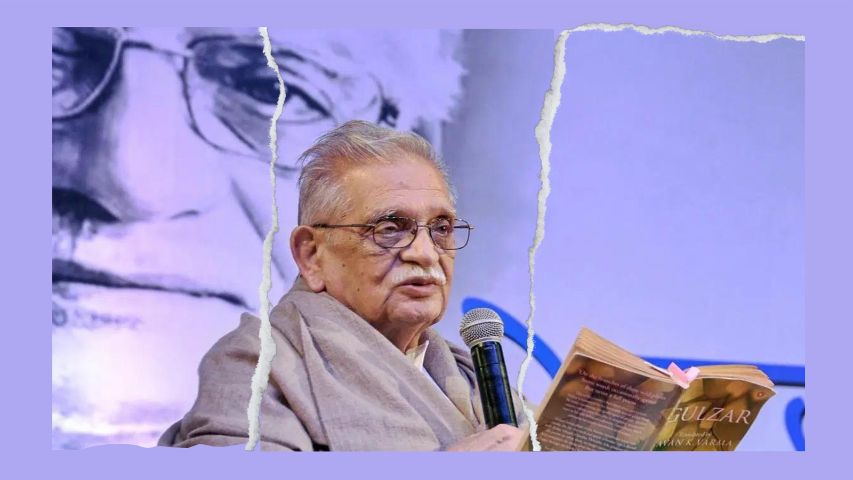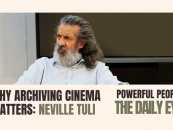-853X543.jpg)
POWERFUL PEOPLE: THE POET IMPRESSIONIST
by HUMRA QURAISHI February 25 2024, 12:00 am Estimated Reading Time: 6 mins, 32 secsOn the occasion of the 58th Jnanpith Award for Gulzar saab, Humra Quraishi revisits her friendship with him and recalls his works of poetry and writings dear to her.
The 58th Jnanpith Award for the year 2023 has been awarded to Swami Rambhadracharya for Sanskrit and Gulzar for Urdu. Gulzar saab has earlier received the Sahitya Akademi Award for Urdu in 2002, the Dadasaheb Phalke Award in 2013, the Padma Bhushan in 2004, and at least five National Film awards for various of his works.
He's one Bollywood personality who writes, reads and converses in the Urdu language up to this day. With that background, I asked him this question on an earlier occasion: In the times we are living, is it tough to speak Urdu? Did you ever suffer from a complex on account of it? And, he replied, “No, never. I’ve always been comfortable with Urdu. In fact, the only time I’ve suffered from a complex was when I couldn’t complete my graduation. For a long time it bothered me because a degree meant a lot. I wasn’t able to complete my graduation because of financial constraints. And, perhaps, to make up for it, I took to reading and writing. Reading has been a passion right from childhood.’’
He told me that books written by Rabindranath Tagore have been of great significance to him. “After the Partition, our family shifted to Old Delhi's Subzi Mandi locality. Somehow, early on, I became a voracious reader, borrowing books from a local shop. One day, I got hold of Tagore's ‘Gardener’. Reading that changed the entire course of my life and thinking. It can be called the turning point of my life.”
He also said that the Kashmir Valley has always fascinated him. “Raakhee and I had gone to Srinagar for our honeymoon. We often teased our daughter Bosky that she was conceived in the valley. We stayed at the Oberoi Hotel in Srinagar. Its garden had two majestic Chinars, I called them Badshah and Begum, or Jehangir and Noorjehan. Years later I saw them again, and they looked so forlorn. Kashmir is an integral part of my emotions, it’s a region close to my heart. I once planned to make a film on Kashmir. I even named it ‘Is Vaadi Mein’ and the story was based on Krishna Chander’s short stories collection ‘Kitaab Ka Kafan’ - it dealt with two lovers in two different parts of the Valley, and how they try to overcome military barriers. Sadly, the film could not be made as the Kargil War broke out.”
A short while ago, Gulzar saab’s short-story collection published by Penguin ‘Half a Rupee Stories’, was released in New Delhi. I wasn’t able to attend the launch because my cousin met with a fatal road accident in Uttar Pradesh. On my return I was touched to know that he had dedicated one of the stories in the volume to me. It was accompanied with this line: “We shared a lot of Kashmir though neither of us is from there.” And, in his second collection of short stories and essays titled ‘Footprints on Zero Line-Writings On The Partition’ (Harper Collins), he once again dedicated the story to me.

Gulzar saab has written many books by now. “Writing is centre-stage,” he told me. “There are many books in my head and I want to complete them…writing is important. It is a shock absorber. It has the capacity to absorb upheavals, pains, all the conditions you're going through. It is like driving along a road, which could be uneven or bumpy, and writing becomes your vehicle. It takes you along, as though you are riding a tiger! I have been witnessing some life altering events since my childhood. When the Partition took place, I was very young but I could see and sense the pain around me, how thousands of people went through that upheaval. I have been witnessing realities, and I have been writing about them.”
He once said to me that he loves writing for children, “I love writing for children, it’s fulfilling. Today we are snatching away the childhood of our children, by putting them too early into formal education - we are shrinking that crucial phase of life. My worry is that in the coming years, children will get extremely lonely, especially in urban locations.”
The more I read Gulzar saab’s writings, the more amazed I am by the sheer expanse and sensitivity of his verse and prose. There’s simplicity and thus, the instant connection. His fans are everywhere, across the world, there are no barriers and boundaries for him to struggle past.
Gulzar saab’s works on the Partition encapsulate the trauma and pain of displaced Indians facing divisive times and resonate with everyone in the subcontinent, even the next generations. His first-hand account of going through those turbulent times, reflects the sorrow and hardships of millions.
I read one of Gulzar saab’s earlier published works before writing this piece. ‘Footprints on Zero Line-Writings On The Partition’ (Harper Collins) is dedicated to his place of birth. He writes: ‘To Dina, my birthplace in Pakistan’.
He dwells on Dina and what the people there experienced. I quote him here: “I have witnessed the Partition. I have experienced the Partition. Standing on Zero Line I am still watching the trail of Partition. Seventy years have passed. Time has not been able to blow off the footprints. I don’t know how long it will take for them to sink into history and be the past.”
Tucked in this volume is also this beautiful verse by him:
Walking up to Wagah with measured steps/When I came to stand at the Zero line/My shadow fell on Pakistan!/The sun was behind me/And my abbu was standing in front/He saw me/Resting his stick on the ground/He smiled and said,/‘When I had left my body there/I came back home, Punni!’//Abbu used to call me ‘Punni.’/‘I had hoped you would come,/For you had not received the news of my death/I knew you would come to bid me farewell!’//Startled, the moment paused/He tapped the ground with his stick/Stretching his hand, he said:/‘Come, let us go to Dina!’/My friends who had come to receive me at Wagah/Held me by the hand and took me to Lahore/In the din of the city no voices came back to me/But I could see a trail of silence/That led to Dina…”
I’ll end today, with these lines written by Gulzar saab, which are apt for these times we are living through:
Nothing is permanent, nothing at all/Days and nights fall, on the chausar board/Like kauri shells some face up, others down/The months and years dealt out to you/Slip through fingers/Nothing is permanent, nothing at all/And what is permanent is me /I, who is changing at every instant.





-173X130.jpg)
-173X130.jpg)
-173X130.jpg)
-173X130.jpg)
-173X130.jpg)

